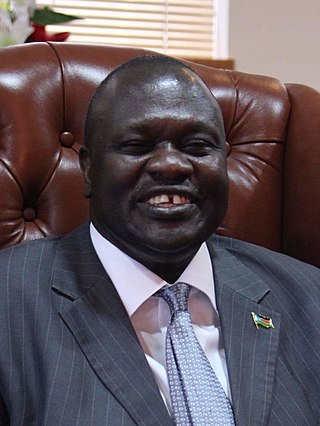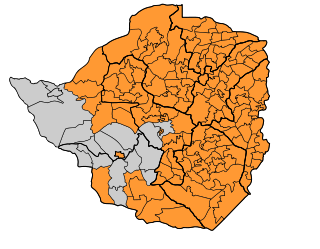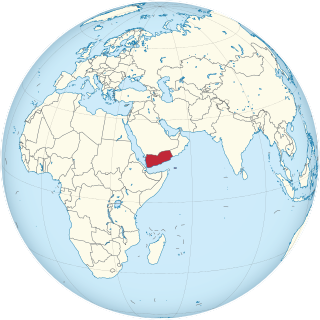| |||||
| Decades: | |||||
|---|---|---|---|---|---|
| See also: | |||||
The following lists events that happened during 2015 in the Republic of South Sudan .
| |||||
| Decades: | |||||
|---|---|---|---|---|---|
| See also: | |||||
The following lists events that happened during 2015 in the Republic of South Sudan .

Cholera is an infection of the small intestine by some strains of the bacterium Vibrio cholerae. Symptoms may range from none, to mild, to severe. The classic symptom is large amounts of watery diarrhea lasting a few days. Vomiting and muscle cramps may also occur. Diarrhea can be so severe that it leads within hours to severe dehydration and electrolyte imbalance. This may result in sunken eyes, cold skin, decreased skin elasticity, and wrinkling of the hands and feet. Dehydration can cause the skin to turn bluish. Symptoms start two hours to five days after exposure.

Médecins Sans Frontières, also known as Doctors Without Borders, is a charity that provides humanitarian medical care. It is a non-governmental organisation (NGO) of French origin known for its projects in conflict zones and in countries affected by endemic diseases. The organisation provides care for diabetes, drug-resistant infections, HIV/AIDS, hepatitis C, tropical and neglected diseases, tuberculosis, vaccines and COVID-19. In 2019, the charity was active in 70 countries with over 35,000 personnel; mostly local doctors, nurses and other medical professionals, logistical experts, water and sanitation engineers, and administrators. Private donors provide about 90% of the organisation's funding, while corporate donations provide the rest, giving MSF an annual budget of approximately US$1.63 billion.

Sudan, officially the Republic of the Sudan, is a country in Northeast Africa. It borders the Central African Republic to the southwest, Chad to the west, Libya to the northwest, Egypt to the north, the Red Sea to the east, Eritrea and Ethiopia to the southeast, and South Sudan to the south. Sudan has a population of 50 million people as of 2024 and occupies 1,886,068 square kilometres, making it Africa's third-largest country by area and the third-largest by area in the Arab League. It was the largest country by area in Africa and the Arab League until the secession of South Sudan in 2011; since then both titles have been held by Algeria. Sudan's capital and most populous city is Khartoum.

Salva Kiir Mayardit, commonly known as Salva Kiir, is a South Sudanese politician who has been the President of South Sudan since its independence on 9 July 2011. Prior to independence, he was the President of the Government of Southern Sudan, as well as First Vice President of Sudan, from 2005 to 2011. He was named Commander-in-Chief of the Sudan People's Liberation Army (SPLA) in 2005, following the death of John Garang.

Riek Machar Teny Dhurgon is a South Sudanese politician who has served as the First Vice President of South Sudan since 2020.

The third cholera pandemic (1846–1860) was the third major outbreak of cholera originating in India in the 19th century that reached far beyond its borders, which researchers at University of California, Los Angeles (UCLA) believe may have started as early as 1837 and lasted until 1863. In the Russian Empire, more than one million people died of cholera. In 1853–1854, the epidemic in London claimed over 10,000 lives, and there were 23,000 deaths for all of Great Britain. This pandemic was considered to have the highest fatalities of the 19th-century epidemics.

The fourth cholera pandemic of the 19th century began in the Ganges Delta of the Bengal region and traveled with Muslim pilgrims to Mecca. In its first year, the epidemic claimed 30,000 of 90,000 pilgrims. Cholera spread throughout the Middle East and was carried to the Russian Empire, Europe, Africa, and North America, in each case spreading via travelers from port cities and along inland waterways.

The seventh cholera pandemic is the seventh major outbreak of cholera beginning in 1961 and continuing to the present. Cholera has become endemic in many countries. In 2017, WHO announced a global strategy aiming to end the pandemic by 2030.

The 2008 Zimbabwean cholera outbreak was an epidemic of cholera affecting much of Zimbabwe from August 2008 until June 2009. The outbreak began in Chitungwiza in Harare Metropolitan Province in August 2008, then spread throughout the country so that by December 2008, cases were being reported in all 10 provinces. In December 2008, The Zimbabwean government declared the outbreak a national emergency and requested international aid. The outbreak peaked in January 2009 with 8,500 cases reported per week. Cholera cases from this outbreak were also reported in neighboring countries South Africa, Malawi, Botswana, Mozambique, and Zambia. With the help of international agencies, the outbreak was controlled, and by July 2009, after no cases had been reported for several weeks, the Zimbabwe Ministry of Health and Child Welfare declared the outbreak over. In total, 98,596 cases of cholera and 4,369 deaths were reported, making this the largest outbreak of cholera ever recorded in Zimbabwe. The large scale and severity of the outbreak has been attributed to poor sanitation, limited access to healthcare, and insufficient healthcare infrastructure throughout Zimbabwe.

The 2010s Haiti cholera outbreak was the first modern large-scale outbreak of cholera—a disease once considered beaten back largely due to the invention of modern sanitation. The disease was reintroduced to Haiti in October 2010, not long after the disastrous earthquake earlier that year, and since then cholera has spread across the country and become endemic, causing high levels of both morbidity and mortality. Nearly 800,000 Haitians have been infected by cholera, and more than 9,000 have died, according to the United Nations (UN). Cholera transmission in Haiti today is largely a function of eradication efforts including WASH, education, oral vaccination, and climate variability. Early efforts were made to cover up the source of the epidemic, but thanks largely to the investigations of journalist Jonathan M. Katz and epidemiologist Renaud Piarroux, it is widely believed to be the result of contamination by infected United Nations peacekeepers deployed from Nepal. In terms of total infections, the outbreak has since been surpassed by the war-fueled 2016–2021 Yemen cholera outbreak, although the Haiti outbreak is still one of the most deadly modern outbreaks. After a three-year hiatus, new cholera cases reappeared in October 2022.

Seven cholera pandemics have occurred in the past 200 years, with the first pandemic originating in India in 1817. The seventh cholera pandemic is officially a current pandemic and has been ongoing since 1961, according to a World Health Organization factsheet in March 2022. Additionally, there have been many documented major local cholera outbreaks, such as a 1991–1994 outbreak in South America and, more recently, the 2016–2021 Yemen cholera outbreak.

South Sudan, officially the Republic of South Sudan, is a landlocked country in East Africa. It is bordered on the north by Sudan; on the east by Ethiopia; on the south by the Democratic Republic of the Congo, Uganda and Kenya; and on the west by the Central African Republic. South Sudan's diverse landscape includes vast plains and plateaus, dry and tropical savannahs, inland floodplains, and forested mountains. The Nile River system is the defining physical feature of the country, running south to north across its center, which is dominated by a large swamp known as the Sudd. South Sudan has a population of 12.7 million. Juba is the capital and largest city.

The South Sudanese Civil War was a multi-sided civil war in South Sudan fought from 2013 to 2020, between forces of the government and opposition forces. The Civil War caused rampant human rights abuses, including forced displacement, ethnic massacres, and killings of journalists by various parties. Since its end South Sudan has been governed by a coalition formed by leaders of the former warring factions, Salva Kiir Mayardit and Riek Machar. In 2024, the country continues to recover from the war while experiencing ongoing and systemic ethnic violence.
A cholera epidemic began in Nashville, Tennessee, in January 1849 and caused many deaths in the city in 1849 and 1850.
In late 2012, a yellow fever outbreak occurred in the Darfur region of Sudan that was the largest yellow fever epidemic to strike Africa in two decades. On 10 January 2013, the Sudan Federal Ministry of Health and the World Health Organization (WHO) reported that there had been 847 suspected cases since 2 September 2012, including 171 deaths, for an estimated case fatality rate of 20%. A mass vaccination campaign was launched in mid-November. By early January, the five states of Darfur were free of any new cases.

An outbreak of cholera began in Yemen in October 2016. The outbreak peaked in 2017 with over 2,000 reported deaths in that year alone. In 2017 and 2019, war-torn Yemen accounted for 84% and 93% of all cholera cases in the world, with children constituting the majority of reported cases. As of November 2021, there have been more than 2.5 million cases reported, and more than 4,000 people have died in the Yemen cholera outbreak, which the United Nations deemed the worst humanitarian crisis in the world at that time. However, the outbreak has substantially decreased by 2021, with a successful vaccination program implemented and only 5,676 suspected cases with two deaths reported between January 1 and March 6 of 2021.
The COVID-19 pandemic in South Sudan is part of the ongoing worldwide pandemic of coronavirus disease 2019 caused by severe acute respiratory syndrome coronavirus 2. The virus was confirmed to have reached South Sudan on 5 April 2020. The first four confirmed cases were all UN workers.
Events in the year 2010 in Chad.
This article lists events in 2024 in South Sudan.